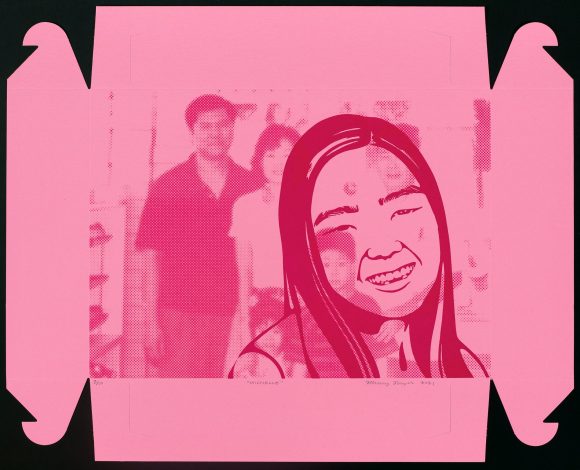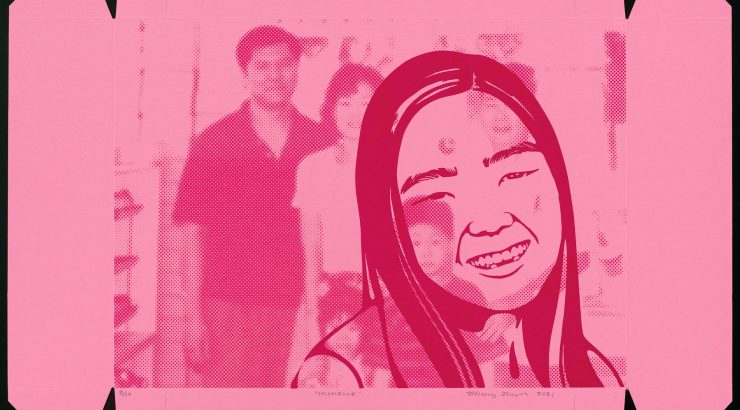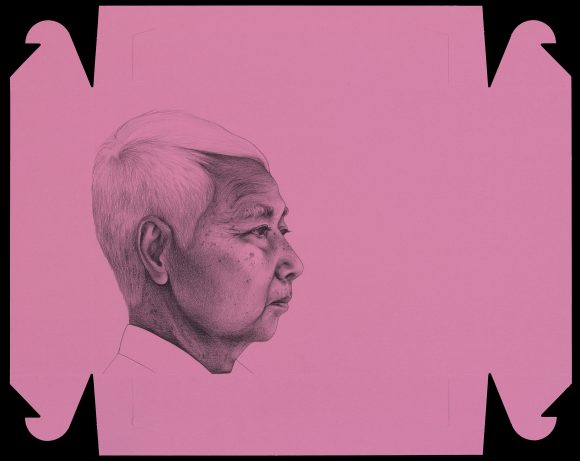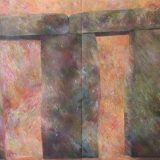Opening the Pink Box Phung Huynh's Donut Box series
April 3, 2024
Created on familiar bright pink boxes, Phung Huynh’s art is an intriguing entrance point into the world of Cambodian refugees and their connection to one of America’s favorite treats: donuts. In works like Vann Nath, the donut boxes serve as the canvas for highly detailed portraits of the artist’s family members and other people from her community.
Phung Huynh’s choice to make this collection of pink donut boxes has its roots in the history of genocide, cultural mobility, and assimilation among the Cambodian people. In 1975, the Khmer Rouge (the Communist regime that ruled Cambodia from 1975-1979) began to systematically execute Cambodians, causing many to flee the country. Some of these refugees ended up in California with little knowledge of the language and practically no items from their home country and old lives. Many immigrants found work in California’s donut shops, and today, around 80% of the donut shops in California are owned and run by Cambodian immigrants. The iconic pink color now associated with donut boxes is a product of this time. These immigrant-owned donut shops often opted for pink pastry boxes over white because they were far less expensive to order.
Having grown up deeply entrenched in the donut shop culture herself, Huynh decided to make these boxes into a site of cultural remembrance. Drawing portraits on the surfaces of these boxes juxtaposes the sugary sweets they contain with the harsh realities of cultural violence and hate, while celebrating the resilience of her community. Her portraits, like Vann Nath, are finely detailed with an almost photo-like appearance. Huynh has commented on the importance of photography to Cambodian culture and the loss of these and other family heirlooms during the genocide. Family photographs and photographs used to worship ancestors had to be left behind by those fleeing Cambodia, breaking a thread that was used to connect generations.

Phung Huynh, Chamroen Eng Donut Box, serigraph on pink donut box, 2021. Purchased with funds from the Escalette Endowment.
Bringing new generations’ lives and faces into public spaces has been central to the artist’s practice since the beginning of her career and is demonstrated in her latest series of donut box prints. In works like Michelle Sou Donut Box and Chamroen Eng Donut Box, Huynh re-prints photographs of second-generation Cambodian immigrants who grew up working at their family-owned donut shops. Beneath their portraits are family or baby pictures – the types of photos that were lost during the genocide but are now being created again. Huynh created this series in collaboration with Dr. Jaspal Sanhu, a UC Berkley professor who created Pink Box Stories, a project that archives the lives and stories of “Donut Kids” throughout California.

Phung Huynh, Michelle Sou Donut Box, serigraph on pink donut box, 2021. Purchased with funds from the Escalette Endowment.
In creating these works, Huynh emphasizes the importance not only of remembering the struggles and pain of the past but also the love and devotion of family and community, and encouraging people to still see the beauty in life and its many possibilities. As said by Huynh, “But donuts matter. Even a fleeting pleasure — that’s good… Like, pleasure and joy are fundamental.”
Sources:
https://www.cbsnews.com/video/doughnut-shops-a-sweet-american-dream/
https://www.artshelp.com/phung-huynh/
https://medium.com/pinkboxstories
We invite you to explore all the works in the Escalette Collection by visiting our eMuseum.
Wilkinson College of Arts, Humanities, and Social Sciences is the proud home of the Phyllis and Ross Escalette Permanent Art Collection. The Escalette Collection exists to inspire critical thinking, foster interdisciplinary discovery, and strengthen bonds with the community. Beyond its role in curating art in public spaces, the Escalette is a learning laboratory that offers diverse opportunities for student and engagement and research, and involvement with the wider community. The collection is free and open to the public to view.



